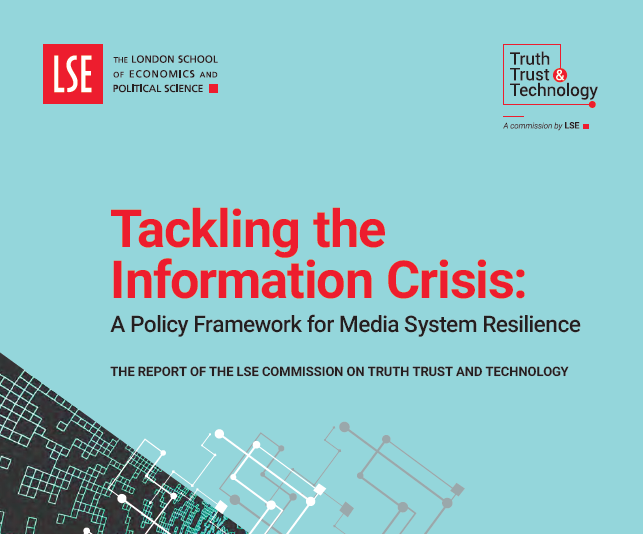 LSE’s Department of Media and Communications celebrates its 20th anniversary this year, and is marking the occasion with the upcoming Media Futures Conference on 15-16 June. The Department’s international journalism think-tank Polis is almost as old as the Department itself: here, Polis founding director Professor Charlie Beckett reflects on how it has evolved as an institute for exploring how journalism and its relationship with society has changed in the last disruptive couple of decades.
LSE’s Department of Media and Communications celebrates its 20th anniversary this year, and is marking the occasion with the upcoming Media Futures Conference on 15-16 June. The Department’s international journalism think-tank Polis is almost as old as the Department itself: here, Polis founding director Professor Charlie Beckett reflects on how it has evolved as an institute for exploring how journalism and its relationship with society has changed in the last disruptive couple of decades.
Two decades ago the legendary sociologist and former LSE Director Tony Giddens astutely spotted that journalism was increasingly significant and ought to be more fully incorporated into the social sciences. Not everyone at LSE back then agreed. When I joined LSE, a senior academic committee queried whether ‘journalism’ was sufficiently important to merit even an option course. But Giddens also realised that to connect the university to journalism properly required an institutional format that allowed a two-way traffic between the academics and the rather isolationist practitioners.
Hence, the creation of Polis, the LSE’s international journalism think-tank, by the first Head of the Media and Communication Department, former TV producer and cosmopolitan theorist, Professor Roger Silverstone. Roger’s visionary understanding of the moral role of news media and his charming optimism about future funding for Polis tempted me away from a 25-year career in journalism and a very happy berth at Channel 4 News. For some reason, I accepted a two-year contract as its first director and a small budget with very short-term, limited funding. Perhaps I sensed that journalism was on the cusp of its most disruptive, creative, disempowered and most influential period since the origins of mass media in the late 19th century. The Internet had already happened while I was still in a newsroom (“It’s my turn on the Internet, please”), but the WWW and social media was in its infancy (“Are bloggers journalists?”). Generative AI was the stuff of the more imaginative science fiction writers.
Journalism studies really only got going as a distinctive branch of social sciences in the last two decades, so it has also been through a period of realignment and development. I have been in a privileged position as a former hack who has been able to feed off the insights brought to my field by the incredible theorists and researchers in my department who sometimes choose to focus on ‘my’ industry and its relationship to the world. Their various personal and theoretical perspectives on journalism draw on different disciplines, interests and approaches and so are an indication of how the study of journalism has moved on from its original rather narrow observation of the ‘profession’.
I was somewhat frustrated by much journalism studies analysis before joining the LSE. It seemed often to be rather obvious and descriptive. Research that told me that the Telegraph was right-wing, for example, or that commercially-owned news organisations were profit-seeking. Or it involved anthropological studies of newsrooms that lacked critical framing and rather genteel histories or personal memoirs. It felt that the authors were either nostalgic (or embittered) ex-journalists, or idealogues who had no understanding of the reality of the industry.
Once I joined LSE I was attracted to more theoretically-grounded approaches. Roger Silverstone’s magnificent and idealistic Media and Morality (2006) published the year I joined the LSE was my philosophical bedrock and is still one of the core texts for the course I teach. Tragically, Roger died within months of my arrival, but I was fortunate to have the continued support and inspiration of some of the leading media academics in the world in my department.
Professor Lilie Chouliaraki was the first to give me an ideological/philosophical framework for understanding a typology of news and its relationship to bigger ideas of representation and humanitarianism. She was kind enough to guest lecture for me. I owe Professor Robin Mansell for securing Polis’ future and my title as Professor of Practice at the LSE. But Robin was also a hard-nosed critic and a brilliant editor who was kind enough to collaborate with me on my first piece of academic journal writing about crossing boundaries with ‘Networked Journalism’. That led to my first book, SuperMedia (2008) a manifesto for how journalism should become more networked.
Dr Damian Tambini is one of our foremost experts on regulation and media and he was a constant accomplice as the UK news industry went through the Leveson years of reflection and reform. Professor Sonia Livingstone was an inspiration in terms of understanding how to have impact on policy-making, for example with her contribution to our LSE Truth, Trust and Technology Commission. Professor Shani Orgad also collaborated with me on teaching. We even had a call and response pair of lectures where she explored representations of suffering and I replied with the ‘newsroom perspective’.
These early interactions were like an intellectual gymnasium for me as I sought to create a forum where journalists from around the world could consider how their work was changing with the coming of the Internet, social media, globalisation and the reshaping of societies through forces such as feminism and post-colonialism.
I even had a brief period as Head of Department at a point when we were making a major shift from being a ‘new’ and relatively small LSE unit towards our current status as a medium-sized, world-class department with a much more diverse range of interests and staff. It is now even more of an inspirational place to work for a journalism expert, as we come to understand the news media as much more related to wider trends in technology, politics and society.
Polis has become a small but effective vehicle for engagement, research and capacity building. In its early phase Polis was interested in a wide range of issues from ‘new media’ to media development in the Global South. We tackled everything from the role of Twitter to community radio in African shanty-towns. In the last five years our focus has narrowed down to journalism and Artificial Intelligence. We still dabble in other issues but the Polis/LSE JournalismAI project is now a major world-leading centre in understanding the role of these technologies and helping catalyse their responsible use by newsrooms around the world. Paradoxically, this narrowing of focus has broadened our engagement. My JournalismAI colleagues based in London, Berlin, Bangalore, South America and the Middle East now work with a network of thousands of journalists (and researchers and policy-makers) from more than 100 countries. We have built a cutting-edge resource for training, experimentation and deliberation that is both useful and critical. It is a model for active learning and engaged research that has benefits for students, researchers and practitioners, as well as society in general. Our outcomes are multiple reports, articles, training and reference resources as well as a legacy of personal development and innovation for journalists around the world from every kind of news organisation.
All this reflects how journalism, and media and communications in general, has developed as an academic field. It is impossible to pin down exactly where the boundaries are. That is why I adore working within this diverse department and the wider LSE with its global connectivity and intellectual range. That cosmopolitan, pluralistic curiosity and moral purpose was what attracted me to journalism in the first place, along with the sense of perpetual, head-spinning historical change. The times continue to be exciting…
This article reflects the views of the author and not those of the Media@LSE blog nor of the London School of Economics and Political Science.
Featured image: Photo by Filip Mishevski on Unsplash





